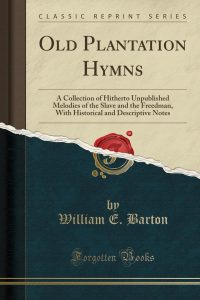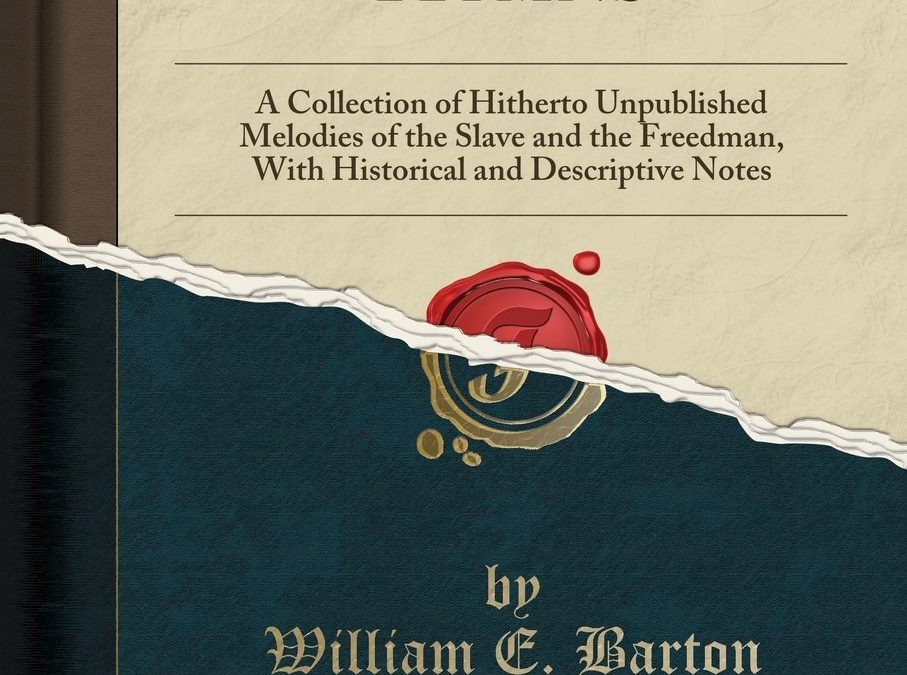A Plantation Hymn for Catholics
A Plantation Hymn for Catholics

- Adoration
- Beliefs
- Blessed Trinity
- Catholic Church
- Cross (Acceptance of)
- Dangerous People
- Death
- Devout Catholics
- Difficult People
- Easter
- Evil
- Faith
- Family
- Fear
- Gay Marriage
- Gender Identity
- Happiness
- Hate
- Heaven
- Hope
- Keys To Greatness
- Kingdom of God
- Lapsed Catholics
- Lent
- Popular Culture
- Redemption
- Salvation
- Sin
- Taking Action
- Virtues
- Works of Mercy
 Did you know that there’s an old plantation hymn that Catholics traditionally sing in church on Good Friday? The hymn was composed in the 19th century by African American slaves and was first published in 1899 by William Eleazar Barton in his hymnal, Old Plantation Hymns. Here’s the first verse of the hymn:
Did you know that there’s an old plantation hymn that Catholics traditionally sing in church on Good Friday? The hymn was composed in the 19th century by African American slaves and was first published in 1899 by William Eleazar Barton in his hymnal, Old Plantation Hymns. Here’s the first verse of the hymn:
Were you there when they crucified my Lord?
Were you there when they crucified my Lord?
Oh, sometimes it causes me to tremble, tremble, tremble,
Were you there when they crucified my Lord?
The original version of the hymn had three additional verses that began with:
Verse 2: Were you there when they nailed him to the cross?
Verse 3: Were you there when they pierced him in the side?
Verse 4: Were you there when the sun refused to shine?
The hymn was popular among the slaves because it provided them with comfort in the knowledge that the persecution and suffering they were experiencing was, in some ways, similar to what Jesus was forced to endure.
While the second verse of the original version referred to Jesus being nailed to a cross, the word “cross” was later replaced with “tree” to bring the suffering of the slaves more in alignment with our Lord’s suffering. The change provided a more realistic connection between Jesus and the slaves because Jesus was nailed to a tree and left to die while slaves were sometimes hung from trees and left to die.
The Catholic version of the hymn added verses 5 and 6:
Verse 5: Were you there when they laid him in the tomb?
Verse 6: Were you there when they rolled the stone away?
By beginning each verse of the hymn with “Were you there,” the people who wrote the song were able to capture the attention of the listener.
I expect that some of the questions we will hear from God after we die will begin with, “Were you there.” Here are a few examples of some potential questions God might ask us:
● Were you there when they aborted millions of my children?
● Were you there when they outlawed the teaching of my 10 commandments in the public schools?
● Were you there when they legalized, promoted, and encouraged homosexuality, transgenderism, and other deviant sexual behavior?
● Were you there when they poisoned the minds of my children with the belief and justification that they could choose their own gender?
● Were you there when your neighbor was in need of one or more of the spiritual or corporal works of mercy?
By answering yes to any of these questions, you will open yourself up to a follow-up question: “What did you do about it?”
The fact that you are reading this is an indication that there is a strong likelihood that you believe that you will eventually face God for a final judgment.
There are many people who refuse to believe that there is a God who will pass judgment on them when they die. They reject God and everything He stands for. They insist that no one has the right to judge their behavior. I call these people “judgment deniers.”
In the minds of the judgment deniers, there is no right or wrong and no one has a right to judge their behavior. They alone determine what is right and wrong. But they are not satisfied with only living their lives on their own terms. They demand that you and I accept their evil and deviant beliefs and behavior and that we publicly proclaim our support for them. And they insist that we change the way we refer to them in public, such as referring to them with pronouns that are contrary to their biological gender.
Those of us who do our best to lead moral, virtuous lives that are based on the teachings of our religion are perceived by the judgment deniers as being a threat to their beliefs and behavior. That’s why they insist that laws be passed that impose punishments on us for not modifying our speech and behavior to conform with their demands.
One of the reasons they are so adamant about shutting us up and forcing us to accept and approve their evil and deviant behavior is because of their deep-seated, hidden fear that if there is a God who will ultimately judge them, they will be damned for all eternity. By shutting us down and eliminating everything that is associated with faith in God, they are able to justify their beliefs and remove any reminders that there may actually be a God who will someday judge them.
The bottom line is that the judgment deniers will not be satisfied until they have completely eradicated all Jewish and Christian religions, along with the Judeo-Christian values that are critical to the lives, families, society, and culture of the people who are faithful to those religions.
The good news is that you and I do not have any reason to fear our final judgment. Why? Because the death and resurrection of the Son of God guaranteed that as long as we lovingly and courageously continue to take up our cross and follow Him, when we come face to face with Almighty God for our final judgment, we will be welcomed into His glorious Kingdom for all eternity.
Happy Easter!




1 Comment
Our Society needs the voice of Harry and Mother Angelica now more than ever, but I trust and know they are praying for this world from their home in Heaven. Thanks be to God.